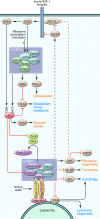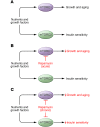Rapalogs and mTOR inhibitors as anti-aging therapeutics
- PMID: 23454761
- PMCID: PMC3582126
- DOI: 10.1172/JCI64099
Rapalogs and mTOR inhibitors as anti-aging therapeutics
Abstract
Rapamycin, an inhibitor of mechanistic target of rapamycin (mTOR), has the strongest experimental support to date as a potential anti-aging therapeutic in mammals. Unlike many other compounds that have been claimed to influence longevity, rapamycin has been repeatedly tested in long-lived, genetically heterogeneous mice, in which it extends both mean and maximum life spans. However, the mechanism that accounts for these effects is far from clear, and a growing list of side effects make it doubtful that rapamycin would ultimately be beneficial in humans. This Review discusses the prospects for developing newer, safer anti-aging therapies based on analogs of rapamycin (termed rapalogs) or other approaches targeting mTOR signaling.
Figures



References
-
- Vezina C, Kudelski A, Sehgal SN. Rapamycin (AY-22,989), a new antifungal antibiotic. I. Taxonomy of the producing streptomycete and isolation of the active principle. J Antibiot (Tokyo). 1975;28(10):721–726. - PubMed
-
- Eng CP, Sehgal SN, Vezina C. Activity of rapamycin (AY-22,989) against transplanted tumors. J Antibiot (Tokyo). 1984;37(10):1231–1237. - PubMed
Publication types
MeSH terms
Substances
Grants and funding
LinkOut - more resources
Full Text Sources
Other Literature Sources
Medical
Miscellaneous

